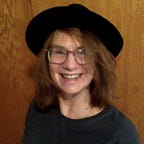Expanding Definitions of Character in Experimental Fiction
Shaking up the default expectations of humanity
Messing with your mind
Obviously nearly all popular narratives will always be about people. That’s what you’ll write, because readers get excited about suspense regarding whether the protagonist will achieve his or her goals.
But if you like to play around outside the box in your stories, let’s release humanocentrism. This is a useful brief thought experiment, in any case, that will flip your mind around.
Try this experiment with your narrative
With a character you chose for a little innovative story you may write, how about breaking apart the old dusty definitions? How about going beyond the normal accepted routine ideas of what a character is?
It is easy to take for granted what a character must be after a history-full of books and movies that define a character in a predictable way. But if you happen to be an experimental writer, then don’t get lazy like that.
The demarcation of a person’s edges is an artificial construct
Within our current quantum paradigm, most educated people are generally familiar with the concept of the continuum of consciousness across the universe and the interaction of all things as being basically one organism that works together as a whole. The outlines we pick for what we label “a person” inside that whole are somewhat random.
Yet even so, most people people automatically tend to consider the self to end at the edges of the skin. But think about it.
Our molecules are not bound to the edges of our skin. Our skin sloughs off regularly and lands on the floor. Are those flakes of dandruff in the bathroom part of us? For how long, exactly, and at what exact moment do we decide they are not us?
We breathe in and out molecules that were in someone else’s skin minutes ago, and which have been in the skin of countless others through their existence through history.
And the tiniest units that make up matter have been found to have memory and decision making abilities.
Why focus on a supposedly static body rather than the flow through the universe?
We could think of ourselves as closed systems. But truly, the breath is a system of interaction between the output of plants and the input of us, and vice versa. Carbon dioxide and carbon monoxide exchanges.
We could write a literary character that is the flow of breath or the journeys of the molecules of the skin. Or a plant being eaten, becoming a human body.
Our labeling of ourselves as closed systems is almost random when it comes to our interactions on mental, and emotional levels as well, as we are made up of all the experiences we have had from a controversial “beginning.” When do we begin and our ancestor’s lives end, considering the revelations around epigenetics?
Can it be a flow of consciousness as it travels from the spanker to the spankee, or from plant to person, and can it be the movement of an idea through a boisterous crowd gaining momentum?
Can it be a school of fish, a school of children as an entity, or a medicine moving through a person?
The dialogue of avant-garde literature is full of possibilities
What other ways can we experiment with where we draw the lines around an entity? The more the characters push the limits of what we would expect, the more we are entering into a cutting edge dialog in literature and thought with other writers and thinkers out there.
To know what the dialog is, reading current experimental magazines is useful. The ones to read to keep up on the pulse are generally the more academic, or obscurely literary ones, many of which are accessible online. Often, if they are not, they are expensive for many readers, so the online ones often carry a lot of weight, with a larger readership.
Different writers ideas are taking literature to the next step. And they have their own versions of what the next step is, with some clumping into groups, such as Quantum Fiction, Magical Realism, Irrealism, and Transgressive. Considering your placement within or without the types of fiction can be helpful, though some writers prefer being fusionists, or revolting against labels altogether.
How about you?
